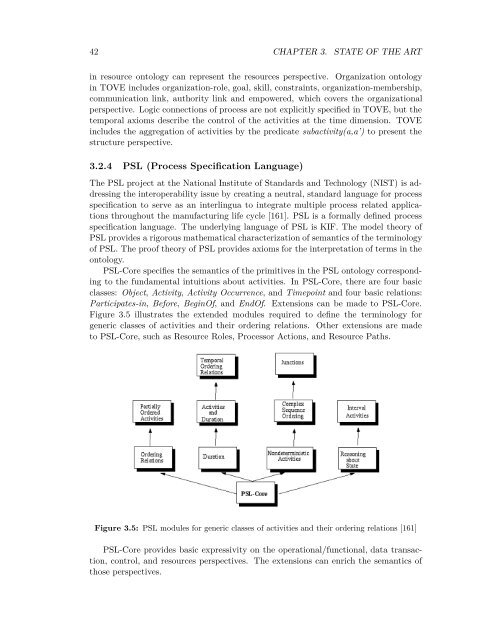Semantic Annotation for Process Models: - Department of Computer ...
Semantic Annotation for Process Models: - Department of Computer ...
Semantic Annotation for Process Models: - Department of Computer ...
You also want an ePaper? Increase the reach of your titles
YUMPU automatically turns print PDFs into web optimized ePapers that Google loves.
42 CHAPTER 3. STATE OF THE ART<br />
in resource ontology can represent the resources perspective. Organization ontology<br />
in TOVE includes organization-role, goal, skill, constraints, organization-membership,<br />
communication link, authority link and empowered, which covers the organizational<br />
perspective. Logic connections <strong>of</strong> process are not explicitly specified in TOVE, but the<br />
temporal axioms describe the control <strong>of</strong> the activities at the time dimension. TOVE<br />
includes the aggregation <strong>of</strong> activities by the predicate subactivity(a,a’) to present the<br />
structure perspective.<br />
3.2.4 PSL (<strong>Process</strong> Specification Language)<br />
The PSL project at the National Institute <strong>of</strong> Standards and Technology (NIST) is addressing<br />
the interoperability issue by creating a neutral, standard language <strong>for</strong> process<br />
specification to serve as an interlingua to integrate multiple process related applications<br />
throughout the manufacturing life cycle [161]. PSL is a <strong>for</strong>mally defined process<br />
specification language. The underlying language <strong>of</strong> PSL is KIF. The model theory <strong>of</strong><br />
PSL provides a rigorous mathematical characterization <strong>of</strong> semantics <strong>of</strong> the terminology<br />
<strong>of</strong> PSL. The pro<strong>of</strong> theory <strong>of</strong> PSL provides axioms <strong>for</strong> the interpretation <strong>of</strong> terms in the<br />
ontology.<br />
PSL-Core specifies the semantics <strong>of</strong> the primitives in the PSL ontology corresponding<br />
to the fundamental intuitions about activities. In PSL-Core, there are four basic<br />
classes: Object, Activity, Activity Occurrence, and Timepoint and four basic relations:<br />
Participates-in, Be<strong>for</strong>e, BeginOf, and EndOf. Extensions can be made to PSL-Core.<br />
Figure 3.5 illustrates the extended modules required to define the terminology <strong>for</strong><br />
generic classes <strong>of</strong> activities and their ordering relations. Other extensions are made<br />
to PSL-Core, such as Resource Roles, <strong>Process</strong>or Actions, and Resource Paths.<br />
Figure 3.5: PSL modules <strong>for</strong> generic classes <strong>of</strong> activities and their ordering relations [161]<br />
PSL-Core provides basic expressivity on the operational/functional, data transaction,<br />
control, and resources perspectives. The extensions can enrich the semantics <strong>of</strong><br />
those perspectives.
















